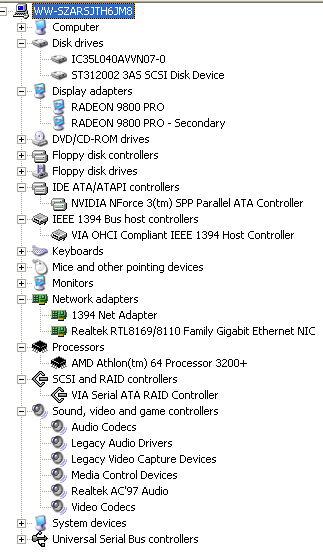System setups and notes
Here's a quick rundown of the test system should you wish to compare benchmark results with your own.AMD Athlon 64 3200+ Clawhammer CPU. RAM running with an 10 divisor (DDR400, single channel)
Intel Pentium 4 3.2GHz ES 800FSB CPU
AMD Athlon 64 FX-51 CPU (2.2GHz, RAM running at Dual-Channel DDR400)
Biostar K8VHA Pro VIA K8T800 S754 Motherboard (1/10/2003 BIOS)
Biostar K8NHA Pro NVIDIA nForce3 150 S754 Motherboard (29/09/2003 BIOS)
ABIT IC7-MAX3 i875P Canterwood (21/08/03 BIOS) for the 3.2GHz 800FSB P4
ASUS SK8N S940 Motherboard
Other components
ATI Radeon 9800 Pro (380/340)
2 x 256MB Corsair XMS3500C2, run at 2-6-2-2 @ DDR400 for the K8VHA Pro, K8NHA Pro and IC7-MAX3 (Dual Channel)
2 x 512MB Legacy Electronics DDR400 ECC memory run at 2.5/8/3/4
Toshiba 8x DVD
Samcheer 420w PSU
Dell P991 19" monitor
Zalman 7000Cu S478/754/940 heatsink and fan
Thermaltake AX478 cooler with a 25CFM fan
Software
Windows XP Professional SP1
DirectX9.0a
Intel 5.00.1015 chipset drivers
NVIDIA nForce3 3.13 drivers
ATI CATALYST 3.7 drivers and control panel (6378s)
Pifast v41 to 10m places
Lame v3.92 MP3 encoding with Razor-Lame 1.15 front-end using U2's Pop album (611MB)
XMPEG v5.02 and DivX 5.05 Pro
Kribi Bench 1.19
ScienceMark 2.0
Realstorm Raytracing benchmark 320x180x32
3DMark 2001SE v330
UT2003 Retail (Build 2225)
X2: The Threat - Rolling Demo
Comanche 4 benchmark
Serious Sam 2: Sierra De Chiapas Demo.
Quake 3 v1.30 HQ
Notes
Both Biostar test boards installed and operated Windows XP SP1 without any problems. Both boards installed their respective features without any undue hassle, too.


Not much to choose between them. It's a chipset battle, really.
Benchmarks were carried out three times and the lowest and highest results were discarded. The running speed of each of the protagonists was as follows:
3208.2MHz - P4 3.2GHz / ABIT IC7-MAX3 (Canterwood)
2200.0MHz - AMD Athlon 64 FX-51 / ASUS SK8N
1999.7MHz - Athlon 64 3200+ / Biostar K8VHA Pro (VIA K8T800)
1994.8MHz - Athlon 64 3200+ / Biostar K8NHA Pro (nForce3 150)
A slight MHz lead for the VIA-based Biostar board.
Overclocking
We decided to approach overclocking from a performance perspective. That entailed keeping a RAM divisor of 10 and raising the FSB gradually. Considering that the K8VHA Pro didn't allow us to toggle voltages, it managed a steady 215MHz FSB or 2150MHz. The K8NHA Pro, on the other hand, ran fine up to 227MHz or 2270MHz. It's unfortunate that we can't unlock the CPU and choose other clock drivers.
In view of the results obtained, we also ran the K8NHA Pro at 2200MHz / RAM @ DDR440 (2-6-2-2 timings) to see how it compares with the 2200MHz dual-channel Athlon FX-51. It'll make for some interesting commentary. On to the benchmarks.









